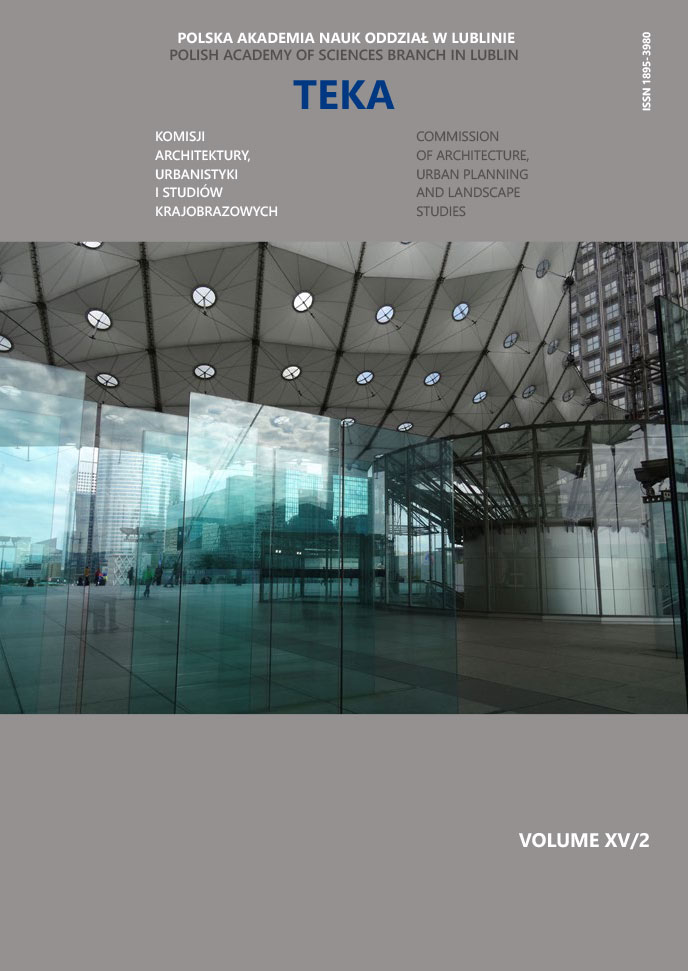Sustainable logistics – a direction of counteracting development problems in cities on the example of Oświęcim
Article Sidebar
Issue Vol. 15 No. 2 (2019)
-
Uncompleted project of the Central Municipal Park in Lublin
Kamila Lucyna Boguszewska7-17
-
Sustainable logistics – a direction of counteracting development problems in cities on the example of Oświęcim
Krystyna Paprzyca18-22
-
Pensions and hotels at the tourist and sports trails of the Giant Mountains
Anna Wojtas-Harań23-32
-
The role of ornament in shaping architectural space on the example of stucco decorations attributed to the workshop of Giovanni Battista Falconi
Beata Klimek33-43
-
Przebudowa Potsdamer Platz jako przykład współczesnego kształtowania przestrzeni publicznej
Anna Szafranek44-53
-
Architectural and urban development of the Romny Midtown in 12th – 19th centuries
Oleh Rybchynskyi, Kateryna Matiiva54-59
-
Features of the fortifications of the Bilsk settlement of the 7th and 4th centuries BC
Kostiantyn Trehubov, Oksana Trehubova, Stanislav Zosim60-67
-
Revisited the localization of fortifications of the 18th century on the surroundings of village of Braha in Khmelnytsky region
Oleksandr Harlan68-72
-
The use of 3D scanning for the inventory of historical buildings on the example of the palace in Snopków
Piotr Gleń, Karol Krupa73-78
-
Enlivening vast green spaces of Zamość. Spatial organization of key recreational areas of the Town. Planty
Katarzyna Kielin79-88
-
Architectural and landscape values of ruined objects on an example of the Castle in Czersk
Katarzyna Drobek89-97
-
Concept of sensory garden in the revitalization project of a housing estate in Krasnystaw
Margot Dudkiewicz, Patryk Krupiński, Sylwia Czapla, Cyprian Moryc98-104
Archives
-
Vol. 17 No. 4
2021-12-30 11
-
Vol. 17 No. 3
2021-12-30 9
-
Vol. 17 No. 2
2021-12-30 8
-
Vol. 17 No. 1
2021-12-30 8
-
Vol. 16 No. 4
2020-12-30 11
-
Vol. 16 No. 3
2020-09-30 10
-
Vol. 16 No. 2
2020-06-30 11
-
Vol. 16 No. 1
2020-03-31 10
-
Vol. 15 No. 4
2019-12-30 6
-
Vol. 15 No. 3
2019-10-31 9
-
Vol. 15 No. 2
2019-06-28 12
-
Vol. 15 No. 1
2019-03-29 13
-
Vol. 14 No. 3
2018-10-28 14
-
Vol. 14 No. 2
2018-06-29 14
-
Vol. 14 No. 1
2018-03-30 13
-
Vol. 13 No. 4
2017-12-29 8
-
Vol. 13 No. 3
2017-09-29 9
-
Vol. 13 No. 2
2017-06-30 10
-
Vol. 13 No. 1
2017-03-31 10
Main Article Content
DOI
Authors
Abstract
The technical infrastructure is one of the essential elements of the system associated with the idea of sustainable development. Urban transport is one of the components of technical infrastructure, and its quality and intensity are often a consequence of "urban sprawl". The phenomenon of uncontrolled spread of the city is currently encountered in many urban centres. It increases the length and time for travels and therefore transport costs. This phenomenon can also have many other negative consequences: – excessive use of land for communication purposes, – the increase of exhaust emission, – the increase in costs related to the use of the car, – the increase of noise on the streets, – increased number of road accidents, – social costs which include lack of exercise, sedentary lifestyle etc.
There are various solutions proposed worldwide, the aim of which is to reduce the number of kilometres travelled by car. Such activities are possible due to all initiatives related to changing lifestyles that are introduced and supported by local government units in cities and municipalities. The goal of all actions aimed at efficient urban transport is to create an economically effective system that also reduces the nuisance to the environment. The problems related to the redesigning of existing streets are focused in particular on safety and limiting traffic. The efficient urban transport system is integrated with the issues related to the close neighbourhood and multi-model solutions connected with the choice of means of transport, as well as the high quality of public spaces and the quality of life of residents. The article discusses the above course of action on the example of the city of Oświęcim.
Keywords:
References
ISO 14040- Environmental management – Life cycle assessment – principles and framework, First Editio, 1997-06-15.
Zarządzanie środowiskiem, Polskie Wydawnictwo Ekonomiczne S.A. Warszawa 00-099, ul. Canaletta 4.
Main characterystics of the land – use Policy In the Netherlands, Minister of Housing and Physical Planning , The Hague, 1994.
Stadsvernieuwing s’Gravenage 1975-1984, Gemente s’Gravenhage, The Hague 1984 Statistics on Housing and construction In the Netherlands, Neth.J.of Housing and the Butli Environment, Vol 9 ( 1994 ) No 1.
Statistics on housing and construction In the Netherlands, Neth. J.of Housing and the Built Environment, Vol 9 (1994) No 1. DOI: https://doi.org/10.1007/BF02496493
S. Gzell, Projektowanie urbanistyczne jako jedno z narzedzi zrównoważenia rozwoju miast- przykład placów Warszawy i Berlina , Trwały rozwój polskich miast nowym wyzwaniem dla planowania i zarządzania przestrzenią, Ewa Heczko-Hyłowa, Cracow University of Technology, Kraków 2001.
R.G. Ridker, I.A. Henning, The Determinant soft Residential Property Values with Special Reference to Air Pollution, Review of Economics and Statistics, 1967, No 49(2). DOI: https://doi.org/10.2307/1928231
Nowa urbanistyka – nowa jakość życia, Materiały III Kongresu Urbanistyki Polskiej, Biblioteka Urbanisty, t. 14, Warszawa 2009, Karta przestrzeni publicznej (opr.: L. Biegański, G. Buczek, S. Gzell, A. Kowalewski, T. Markowski, E. Cichy-Pazder).
Paprzyca K., Harmonizowanie rozwoju urbanistycznego terenów miejskich – wybrane zagadnienia, Monografia 417, Kraków, Wydaw. Politechniki Krakowskiej 2012.
Paszkowski Z., Miasto idealne w perspektywie europejskiej i jego związki z urbanistyką współczesną, Kraków, UNIVERSITAS 2011.
Rewitalizacja miast w Polsce, 2009-2010, Seria wydawnicza pod red. Z. Ziobrowskiego, Instytut Rozwoju Miast, Kraków.
Strategia rozwoju miasta Oświęcim na lata 2014-2020.
OPRACOWANIE KRYTERIÓW CHŁONNOŚCI EKOLOGICZNEJ - PDF Instytut Gospodarki Przestrzennej i Mieszkalnictwa ul. Targowa 45 03-728 Warszawa http://docplayer.pl/7597595-Opracowanie-kryteriow-chlonnosci-ekologicznej.html
http://web.um.oswiecim.pl/strategia-uwagi/strategia_rozwoju_miasta_oswiecim_na_lata_2014-2020.pdf (16.07.2016)
Czynniki rozwoju przedsiębiorczości w ... - Województwo Małopolskie http://www.malopolskie.pl/Pliki/2008/Opracowanie.pdf (16.07.2016)
Plan zrównoważonego rozwoju publicznego transportu ... Plan zrównoważonego rozwoju publicznego transportu zbiorowego http://web.um.oswiecim.pl/bip/dokumenty/pliki/109/24221.pdf
Article Details
Abstract views: 276


